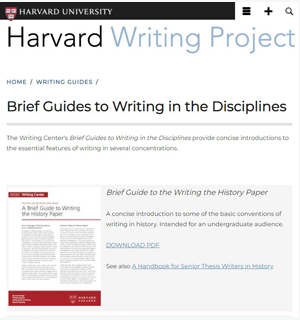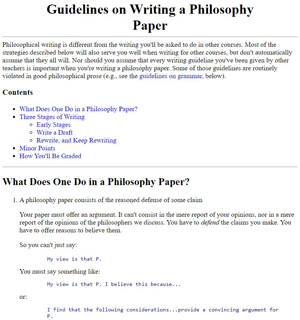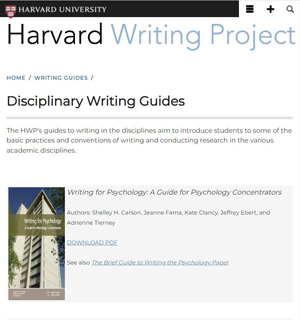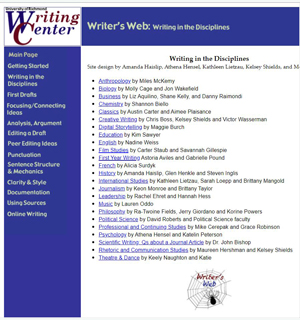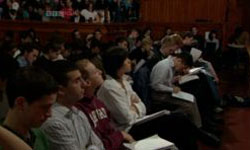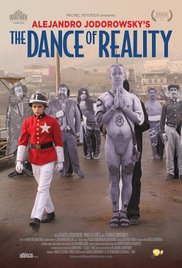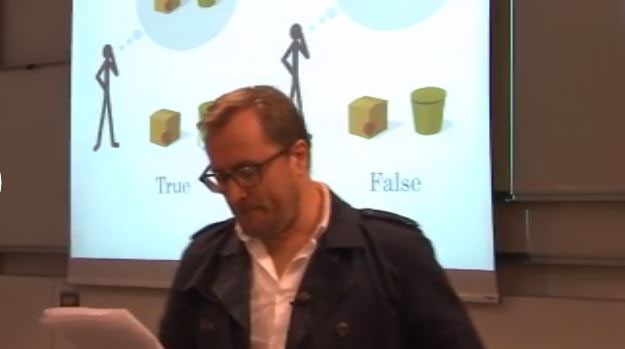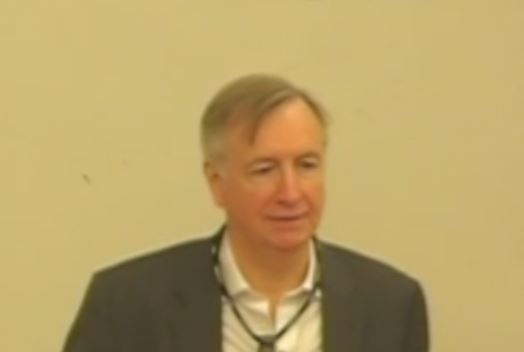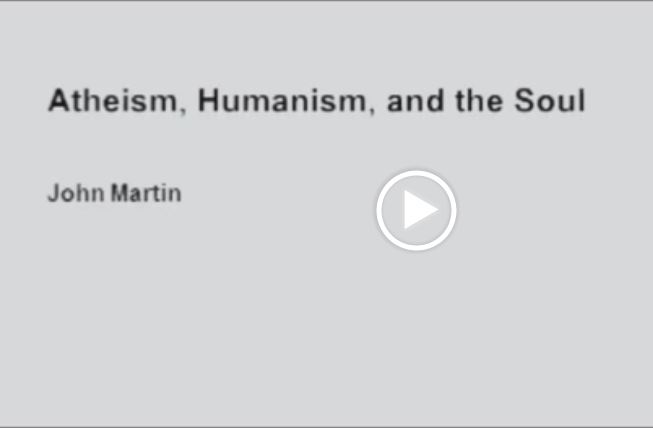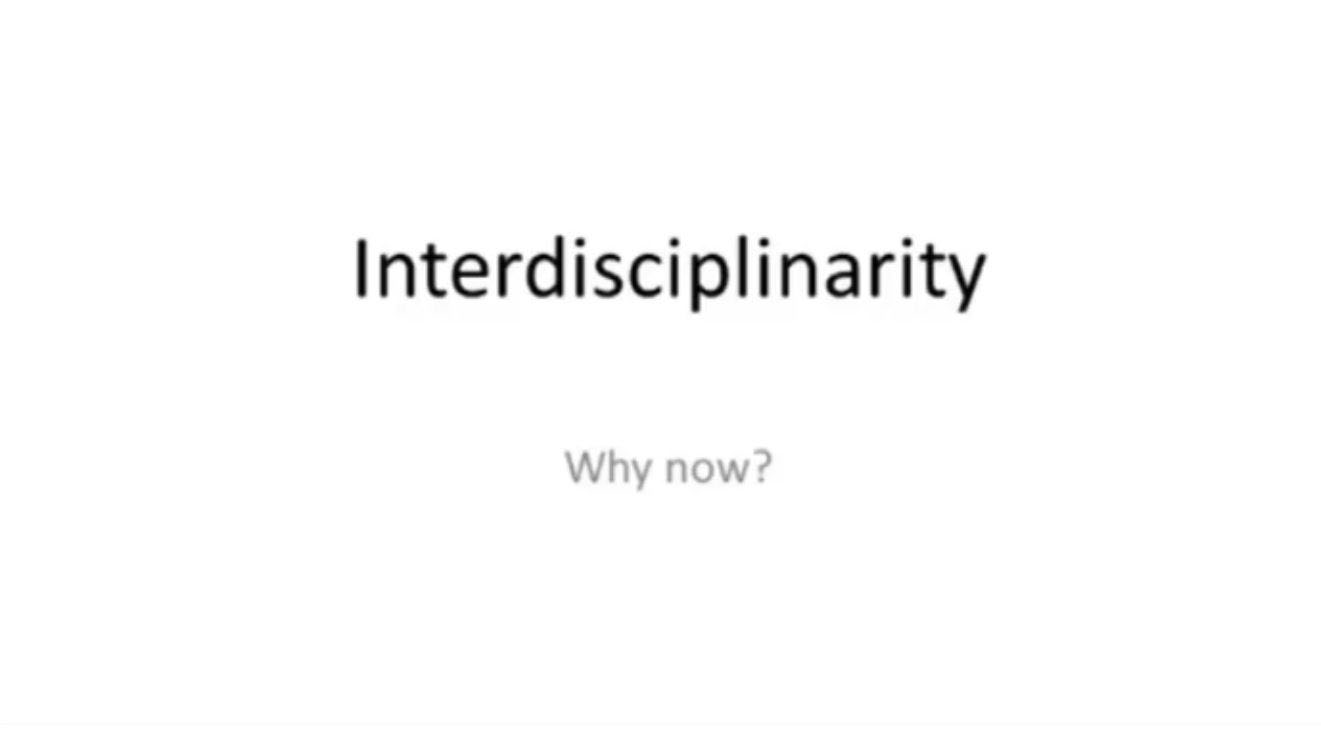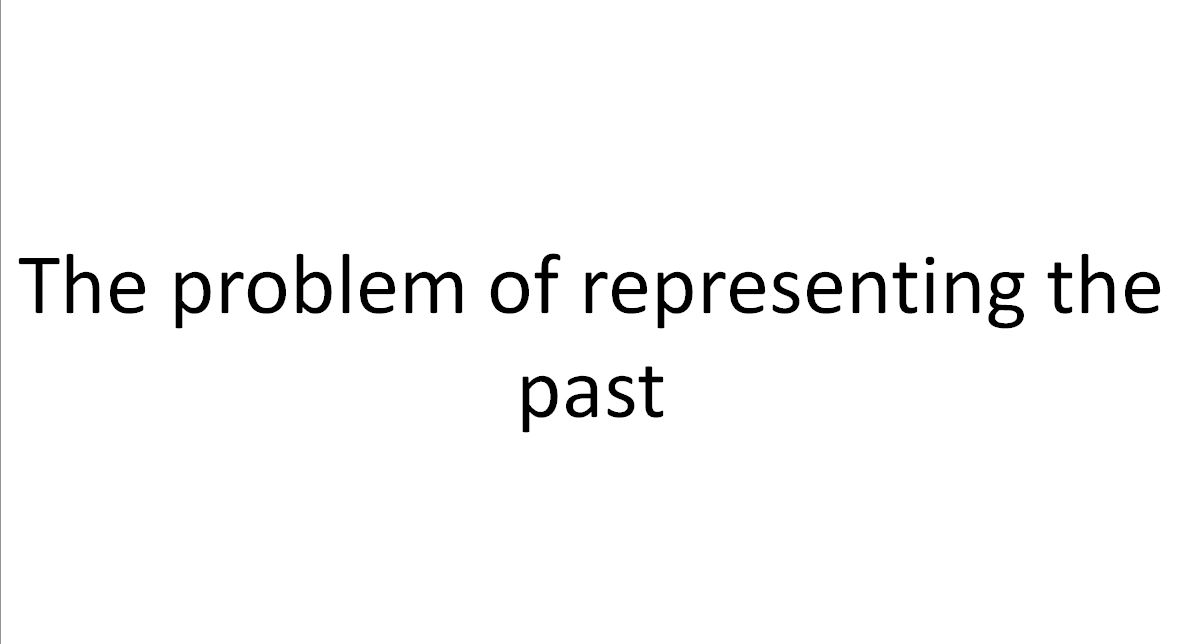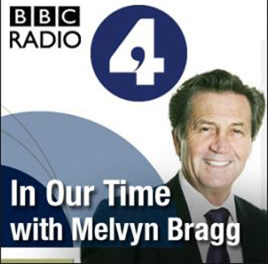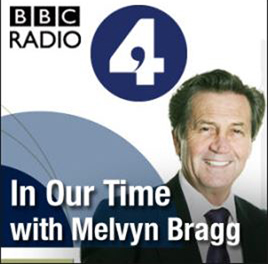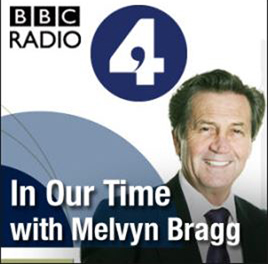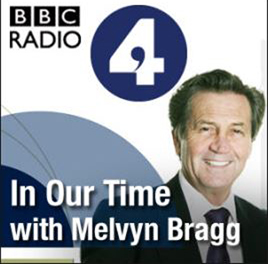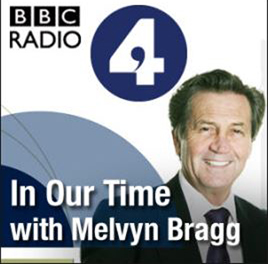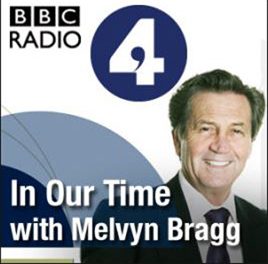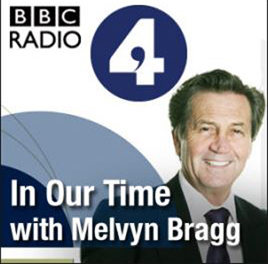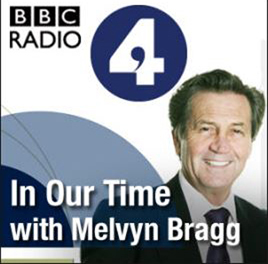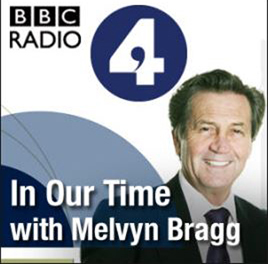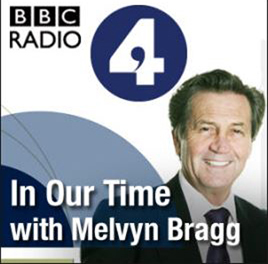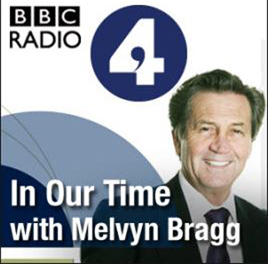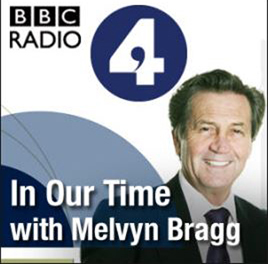Select one or more of these popular tags:
-
Brief Guides to Writing in the Disciplines
-
(Currently) four downloadable breif guides to writing in history, philosophy, English and psychology.
(Currently) four downloadable breif guides to writing in history, philosophy, English and psychology.
-
Guidelines on Writing a Philosophy Paper
-
A guide to writing philosophy papers including purpose and a 3-stage writing process.
A guide to writing philosophy papers including purpose and a 3-stage writing process.
-
Harvard Writing Project
-
A collection of free downloadable pdf books explaining in detail how writing is done in different disciplines (see tags).
A collection of free downloadable pdf books explaining in detail how writing is done in different disciplines (see tags).
-
Writing in Different Disciplines
-
A collection of links to discipline-specific writing advice and help at American universities.
A collection of links to discipline-specific writing advice and help at American universities.
-
Writing in the Disciplines
-
Links to guides to writing in 24 different disciplines.
Links to guides to writing in 24 different disciplines.
The seventh of Harvard professor Michael Sandel's famous lectures on the philosophy of justice looks at the issue of individual rights and the freedom to choose. If our place in society is determined by where we best fit, doesn't that eliminate personal choice? What if I am best suited to do one kind of work, but I want to do another?
- British-Sign-Language
- British-Sign-Language
- Law
- BSL subtitles
- 60
The seventh of Harvard professor Michael Sandel's famous lectures on the philosophy of justice looks at the issue of individual rights and the freedom to choose. If our place in society is determined by where we best fit, doesn't that eliminate personal choice? What if I am best suited to do one kind of work, but I want to do another?
-
Le Nouvel Observateur
Left-wing weekly magazine on current affairs and culture. Only some parts of the magazine are available online for free. A fantastic way to familiarise yourselves with vocabulary suitable for advanced discussions of current affairs, politics as well as historical events and philosophy.
Left-wing weekly magazine on current affairs and culture. Only some parts of the magazine are available online for free. A fantastic way to familiarise yourselves with vocabulary suitable for advanced discussions of current affairs, politics as well as historical events and philosophy.
-
L'avenir
-
Mia Hansen-Løve , 2016
A philosophy teacher soldiers through the death of her mother, getting fired from her job, and dealing with a husband who is cheating on her.
- Films
- English subtitles
- 102
A philosophy teacher soldiers through the death of her mother, getting fired from her job, and dealing with a husband who is cheating on her.
-
La danza de la realidad
-
Alejandro Jodorowsky , 2013
Blending his personal history with metaphor, mythology and poetry, The Dance of Reality reflects Jodorowsky's philosophy that reality is not objective but rather a "dance" created by our own imaginations.
- Films
- English subtitles
- 133
Blending his personal history with metaphor, mythology and poetry, The Dance of Reality reflects Jodorowsky's philosophy that reality is not objective but rather a "dance" created by our own imaginations.
-
A Brief History of Reason
-
Ian Newby , 2015
IPM Lecture 12th October 2015
- Lectures
- No subtitles
- 76
IPM Lecture 12th October 2015
-
An Introduction to Philosophy of Science
-
Prof Donald A Gillies
Diploma Lecture 19 2005-2006
- Lectures
- General Science
- Lectures
- No subtitles
- 60
Diploma Lecture 19 2005-2006
-
Atheism, Humanism and the Soul, 2013
-
Professor John Martin
Diploma lecture 2012-13
Diploma lecture 2012-13
-
Atheism, Humanism, and the Soul
-
Prof. John Martin
Diploma Lecture 2012
- Lectures
- Humanities
- Lectures
- No subtitles
- 40
Diploma Lecture 2012
-
Interdisciplinarity
-
Carl Gombrich , 2015
Please note. The first two minutes of the lecture are audio only ! Pre-sessional Lecture 2015.
- Lectures
- No subtitles
- 52
Please note. The first two minutes of the lecture are audio only ! Pre-sessional Lecture 2015.
-
The Problems of Representing the Past
-
Will Richards , 2014
Diploma 2014
Diploma 2014
-
What's the Point of Philosophy? (with Worksheet)
-
Carl Gombrich , 2011
Diploma 2010/11
- Lectures
- Humanities
- Lectures
- No subtitles
- 60
Diploma 2010/11
-
Great Lives - Baruch Spinoza
-
Sir Harry Kroto
Spinoza was one of the founding fathers of the Idealist school of philosophy, and was described by Bertrand Russell as, "the noblest and most lovable of the great philosophers".
Spinoza was one of the founding fathers of the Idealist school of philosophy, and was described by Bertrand Russell as, "the noblest and most lovable of the great philosophers".
-
In Our Time - Climate Change
-
Melvyn Bragg
With Sir John Houghton, Co-Chair of the Inter-Governmental Panel on Climate Change - the United Nations’ global warming science committee; George Monbiot, environmentalist, journalist and Visiting Professor, Department of Philosophy, Bristol University.
With Sir John Houghton, Co-Chair of the Inter-Governmental Panel on Climate Change - the United Nations’ global warming science committee; George Monbiot, environmentalist, journalist and Visiting Professor, Department of Philosophy, Bristol University.
-
In Our Time - Evil
-
Melvyn Bragg
Melvyn Bragg and guests discuss the concept of evil. With Jones Erwin, Lecturer in Philosophy at the University of Limerick; Stephen Mulhall, Tutor in Philosophy at New College, Oxford University; Margaret Atkins, Lecturer in Theology at Trinity and All Saints College, University of Leeds.
Melvyn Bragg and guests discuss the concept of evil. With Jones Erwin, Lecturer in Philosophy at the University of Limerick; Stephen Mulhall, Tutor in Philosophy at New College, Oxford University; Margaret Atkins, Lecturer in Theology at Trinity and All Saints College, University of Leeds.
-
In Our Time - Good and Evil
-
Melvyn Bragg
With Leszek Kolakowski, author and Professor of Philosophy, Oxford University; Galen Strawson, author and Fellow and Tutor in Philosophy, Jesus College, Oxford.
With Leszek Kolakowski, author and Professor of Philosophy, Oxford University; Galen Strawson, author and Fellow and Tutor in Philosophy, Jesus College, Oxford.
-
In Our Time - Imagination and Consciousness
-
Melvyn Bragg
Melvyn Bragg and guests discuss the question of consciousness, our sense of self, and how we are able to imagine things when they are not there, which are problems that have troubled the great minds of philosophy for thousands of years.
Melvyn Bragg and guests discuss the question of consciousness, our sense of self, and how we are able to imagine things when they are not there, which are problems that have troubled the great minds of philosophy for thousands of years.
-
In Our Time - Laws of Nature
-
Melvyn Bragg
With Mark Buchanan, physicist and author of Ubiquity; Professor Frank Close, theoretical physicist and author of Lucifer’s Legacy: The Meaning of Asymmetry; Nancy Cartwright, Professor of Philosophy, LSE.
With Mark Buchanan, physicist and author of Ubiquity; Professor Frank Close, theoretical physicist and author of Lucifer’s Legacy: The Meaning of Asymmetry; Nancy Cartwright, Professor of Philosophy, LSE.
-
In Our Time - Materialism
-
Melvyn Bragg
What does materialism really mean, how has it developed over time and can we still have free will if we are living in a materialist world? Contributers include; Anthony Grayling, Professor of Philosophy at Birkbeck College, University of London;Caroline Warman, Fellow of Jesus College, Oxford and Anthony O’Hear, Professor of Philosophy at the University of Buckingham
What does materialism really mean, how has it developed over time and can we still have free will if we are living in a materialist world? Contributers include; Anthony Grayling, Professor of Philosophy at Birkbeck College, University of London;Caroline Warman, Fellow of Jesus College, Oxford and Anthony O’Hear, Professor of Philosophy at the University of Buckingham
-
In Our Time - Oceanography
-
Melvyn Bragg
With Margaret Deacon, visiting Research Fellow at Southampton Oceanography Centre and author of Scientists and the Sea, Tony Rice, Biological Oceanographer and author of Deep Ocean, Simon Schaffer, Reader in History and Philosophy of Science at the University of Cambridge, and a fellow of Darwin College.
With Margaret Deacon, visiting Research Fellow at Southampton Oceanography Centre and author of Scientists and the Sea, Tony Rice, Biological Oceanographer and author of Deep Ocean, Simon Schaffer, Reader in History and Philosophy of Science at the University of Cambridge, and a fellow of Darwin College.
-
In Our Time - The Abbasid Caliphs
-
Melvyn Bragg
The Abbasid Caliphs were the dynastic rulers of the Islamic world between the middle of the eighth and the tenth centuries. They headed a Muslim empire that extended from Tunisia through Egypt, Syria, Arabia, and Persia to Uzbekistan and the frontiers of India. But unlike previous conquerors, the Abbasid Caliphs presided over a multicultural empire where conversion was a relatively peaceful business. As Vikings raided the shores of Britain, the Abbasids were developing sophisticated systems of government, administration and court etiquette. Their era saw the flowering of Arabic philosophy, mathematics and Persian literature. The Abbasids were responsible for patronising the translation of Classical Greek texts and transmitting them back to a Europe emerging from the Dark Ages.
The Abbasid Caliphs were the dynastic rulers of the Islamic world between the middle of the eighth and the tenth centuries. They headed a Muslim empire that extended from Tunisia through Egypt, Syria, Arabia, and Persia to Uzbekistan and the frontiers of India. But unlike previous conquerors, the Abbasid Caliphs presided over a multicultural empire where conversion was a relatively peaceful business. As Vikings raided the shores of Britain, the Abbasids were developing sophisticated systems of government, administration and court etiquette. Their era saw the flowering of Arabic philosophy, mathematics and Persian literature. The Abbasids were responsible for patronising the translation of Classical Greek texts and transmitting them back to a Europe emerging from the Dark Ages.
-
In Our Time - The Brain and Consciousness
-
Melvyn Bragg
With Steven Rose, Professor of Biology and Director of the Brain and Behaviour Research Group, Open University, Dan Robinson, Distinguished Research Professor, Georgetown University and visiting lecturer in Philosophy and Senior Member of Linacre College, Oxford University.
With Steven Rose, Professor of Biology and Director of the Brain and Behaviour Research Group, Open University, Dan Robinson, Distinguished Research Professor, Georgetown University and visiting lecturer in Philosophy and Senior Member of Linacre College, Oxford University.
-
In Our Time - The Consolation Of Philosophy
-
Melvyn Bragg
The Consolation of Philosophy was read widely and a sense of consolation is woven into many philosophical ideas, but what for Boethius were the consolations of philosophy, what are they more generally and should philosophy lead us to consolation or lead us from it?
The Consolation of Philosophy was read widely and a sense of consolation is woven into many philosophical ideas, but what for Boethius were the consolations of philosophy, what are they more generally and should philosophy lead us to consolation or lead us from it?
-
In Our Time - The Individual
-
Melvyn Bragg
With Richard Wollheim, Professor of Philosophy, University of California in Berkeley; Jonathan Dollimore, Professor of English, York University.
With Richard Wollheim, Professor of Philosophy, University of California in Berkeley; Jonathan Dollimore, Professor of English, York University.
-
In Our Time - The Philosophy of Love
-
Melvyn Bragg
Melvyn Bragg and guests discuss the philosophy of love. With Professor Roger Scruton, author of many books including Sexual Desire; Angie Hobbes, lecturer in philosophy at Warwick University; Thomas Docherty, Professor of English at the University of Kent.
Melvyn Bragg and guests discuss the philosophy of love. With Professor Roger Scruton, author of many books including Sexual Desire; Angie Hobbes, lecturer in philosophy at Warwick University; Thomas Docherty, Professor of English at the University of Kent.
-
In Our Time - Utopia
-
Melvyn Bragg
Melvyn Bragg and guests discuss the concept of Utopia. With Dr Anthony Grayling, human rights campaigner, lecturer in philosophy at Birkbeck College, London and Fellow of St Anne’s College, Oxford; John Carey, distinguished critic, journalist, broadcaster, Merton Professor of English, Oxford University and editor of, The Faber Book of Utopias.
Melvyn Bragg and guests discuss the concept of Utopia. With Dr Anthony Grayling, human rights campaigner, lecturer in philosophy at Birkbeck College, London and Fellow of St Anne’s College, Oxford; John Carey, distinguished critic, journalist, broadcaster, Merton Professor of English, Oxford University and editor of, The Faber Book of Utopias.

